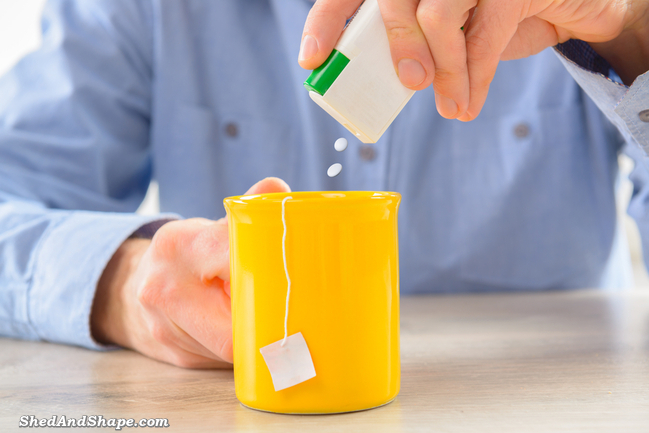Those looking to lose weight or want to live a healthier lifestyle often ditch table sugar in favor of sugar substitutes, which have the sweet taste of sugar but with fewer calories and carbs. However, some claim that sugar may actually be healthier than these artificial sweeteners. Which led many people to ask, “Are sugar substitutes bad for you?”
When following a keto diet, one of the things you need to avoid is sugar. Eating sugar or sweets can increase your blood sugar level, making it difficult for your body to reach ketosis. But giving up sugar is not that easy, especially for those with a sweet tooth. Because of this, many have turned to sugar substitutes as a sweetener for their favorite drinks or desserts.
Related reading: Artificial Sweeteners on Keto? Good or Bad?
In this article, let’s find out some of the most popular sugar substitutes and address the question – are sugar substitutes bad for you?
What are Sugar Substitutes?
As the name suggests, sugar substitutes are substitutes for sugar. They taste sweet, but they do not contain sugar. Because of this, they have fewer calories than sugar. Other varieties do not have any calories at all. Some are low in carbs, while others have zero carbs.
You will often encounter desserts or other sweet treats labeled “sugar-free.” These recipes are made using sugar substitutes to give them a sweet taste without the carbs or calories that come with using actual sugar.
Sugar substitutes often fall into three categories – artificial sweeteners, sugar alcohols, and novel sweeteners.
1. Artificial Sweeteners
Most artificial sweeteners are produced from chemicals in a lab. Some are made of natural substances and can be up to 700 times sweeter than sugar. These sweeteners do not have sugar or calories and will not provide beneficial nutrients. Some of the most common examples of artificial sweeteners are aspartame, sucralose, and saccharin.
2. Sugar Alcohols
Like artificial sweeteners, sugar alcohols are produced synthetically in a lab and are often used in processed foods. Sugar alcohols are not as sweet as artificial sweeteners, but they add texture and taste to foods like candies and chewing gum. Examples are erythritol, maltitol, mannitol, sorbitol, and xylitol.
3. Novel Sweeteners
Novel sweeteners are made from natural sources, such as honey and fruits, and are also called “plant-derived sweeteners.” Since they do not contain significant calories or sugar, they cannot cause blood sugar spikes. Examples are monk fruit, stevia, and allulose.
Related reading: 4 Best Natural Low Carb Sweeteners
Are Sugar Substitutes Bad for You?
Now that we have an idea on what sugar substitutes are, let’s try to address the question, are sugar substitutes bad for you?
In a newly released guideline the World Health Organisation has finally come out and said that artificial sweeteners are not good for you. They have warned against using artificial sweeteners to lose weight saying that long-term use is not effective and could pose health risks.
Several studies were done to determine the effects of sugar substitutes on our body. However, scientists are divided in their views about their safety. Further research is needed to understand how these substances can affect our health. However, some data suggest that sugar substitutes may come with the following health concerns:
Altered Gut Microbiome
Gut bacteria react differently to sugar substitutes than they do to real sugar. Sucralose and saccharin could alter the gut microbiome, leading to dysbiosis, an imbalance of good and bad bacteria in the gut. They could leave you with symptoms like bloating, migraines, irritability, anxiety, and mood changes.
However, some studies suggest that sugar alcohols like erythritol, mannitol, maltitol, and sorbitol are considered prebiotics since they are not digested until they reach the large intestines. This means they help support good gut bacteria. Unfortunately, those with IBS should avoid erythritol as this could make them suffer from upset stomach.
In addition, sugar alcohols have also been found to cause gastrointestinal irritation like gas, diarrhea, or bloating in some individuals. While stevia, a popular novel sweetener, could disrupt the microbiome and may be unhealthy for the gut.
Poorly Regulated Blood Sugar
While artificial sweeteners do not contain sugar and will not increase blood sugar levels, some evidence shows that they tend to increase insulin in the blood. Due to their sweet taste, the pancreas could mistake them for sugar. It will trigger a cephalic phase insulin release, which can cause a small increase in insulin levels.
In addition, long-term consumption of artificial sweeteners can increase the frequency of reactive hypoglycemia. It’s a condition where the blood sugar level becomes low after eating.
Since the sweeteners can trigger an increase in insulin, this will lower the blood sugar level even though the body has not received any calories from the sweetener. So, even if artificial sweeteners cannot directly increase blood sugar, they can lead to a poorly-controlled blood sugar level.
Artificial Sweeteners Can Be Addicting
We have been told since we were young to consume sugary and sweet foods in moderation. They do not have much to offer in terms of beneficiary nutrients. Instead, they will release dopamine in the body, the feel-good neurotransmitter (brain chemical) that brings pleasure. It is for this reason that sugar can be addicting.
Sugar substitutes, particularly artificial sweeteners, can give you that sweet taste your body craves. The problem is that these sweeteners are up to 700 times sweeter than sugar. As a result, they will completely bombard your nervous system with dopamine-releasing sweetness, leaving you craving more.
Related reading: 5 Healthy Snacks To Kill Sugar Cravings
According to Dr. Melissa Young,
“When you’re consuming artificial sweeteners, your body starts to crave more of it. And it can be easier to give in to that craving because you think you’re making a healthier choice.”
Final Thoughts
So, are sugar substitutes bad for you? Artificial sweeteners are best avoided. Low carb sugar substitutes such as those used on the keto diet are not bad if you use them sparingly as a substitute for table sugar. They are ideal for people looking to reduce their carb or calorie intake to lose weight or simply want to live a healthy lifestyle.
But, as with anything, too much can be bad for your health. As stated above, sugar substitutes could harm your gut, lead to poorly regulated blood sugar levels, and can make you addicted to sugar.
If you must use a sugar substitute, consider using plant-derived sweeteners like stevia, lucuma or monk fruit instead of artificial sweeteners.










